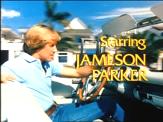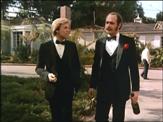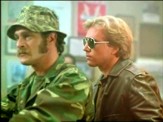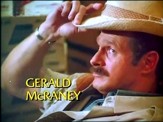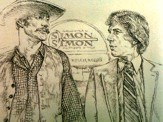|
His interest in acting began when he injured a knee playing football in junior high school and found the only activity openings left were in the drama club. Encouraged by his performances in school productions, he enrolled at the University of Mississippi as a drama major. A year later, he dropped out. "In my freshman year," he explains, "I was in six out of seven major productions and I really hadn't learned any more than I knew when I got there, although I knew there was a hell of a lot more to learn."
Failing an audition for a New Orleans repertory company, he went to work in the Louisiana oil fields and on offshore rigs in the Gulf of Mexico. McRaney's dream to act persisted, however. A year later, in 1967, he went back to audition in New Orleans and was hired as an assistant stage manager at $125 a week. Eventually he was cast in a few productions and he stayed with the company for four years, until it was forced to shut down because of reduced government funding.
After making some low-budget movies in Louisiana, McRaney moved to Hollywood, where he drove a cab to support his family and to finance his acting classes while he was looking for roles.
His acting coach, actor-director Jeff Corey gave him his first TV role in an episode of "Night Gallery." Four appearances on "Gunsmoke" led to steady work as a character actor in television movies such as "Where the Ladies Go," "Women in White," "The Law," "Roots II," and in many series, including "The Incredible Hulk," "The Rockford Files," "Police Woman," and "How the West Was Won."
McRaney has the distinction of being the last gunfighter to square off against Matt Dillon (James Arness) in the final episode of "Gunsmoke." "That was a childhood fantasy come true," he says. "I got to strap on a six-gun and challenge Matt Dillon. I can't think of another role that made me feel as good." He was also featured in Wolfgang Petersen's film, "The Never Ending Story."
Having attained a certain measure of success, McRaney began to turn down pilots he did not think he could stay with for five years in the event they became series. "I had to consider that it's not just a pilot," he explains. "I had to think ahead. How much would I really enjoy committing five or seven years to working on this? When you're an unemployed actor offered a TV pilot, no matter who you are you're tempted by the good hunk of change to be made. It keeps you out of the unemployment line."
His talent and professionalism so impressed highly respected TV producer Philip DeGuere that he had McRaney test for a series pilot titled "The Gypsy Warriors." But studio executives insisted that he did not fit the mold of the TV hero. They chose Tom Selleck, instead. Two years later, when DeGuere was making the pilot for "Pirate's Key," which later became "Simon and Simon," someone said, "what about Gerald McRaney?" DeGuere recalls that McRaney "blew everybody away in the test."
When "Simon & Simon" came along, McRaney never hesitated. "I was lucky. For the last four or five years, I had been in the position where I didn't have to take a pilot. I took this one because the script and the people were terrific. It never frightened me. As we were doing the pilot, I could tell that it was working."
The series gave McRaney the opportunity to direct. He is particularly proud of a segment he directed which dealt with adolescent drug abuse. He demonstrated in that show how drug abuse can be deglamourized. He and a group of other film production professionals formed The Entertainment Industries Council for a Drug-Free Society, an organization dedicated to lobbying producers, directors and actors to communicate the dangers and evils of drug abuse through film and television. In that role, he has testified before the Senate Subcommittee on Investigations to obtain Senate endorsement of the group's efforts.
He also co-wrote a segment of "Simon and Simon" titled "I Thought the War Was Over" in which Rick Simon suffers from post-traumatic stress disorder. He directed several episodes of "Major Dad" and a TV movie, "Love and Curses," where he also served as executive producer and co-starred with his wife, actress Delta Burke.
He and his wife live in the Vieux Carre of New Orleans and have a farm in Mississippi near his birthplace. McRaney has three children, Jessica, Angus and Katy. An outdoors enthusiast, he is an expert camper, hunter and fisherman.
ABILITY Editor-in-Chief Chet Cooper interviewed Gerald McRaney a few weeks after the annual Media Access Disability Awareness Awards, where the actor served as master of ceremonies for the third time. A longtime supporter of the Media Access Office, he has championed the casting of actors with disabilities in many of the productions with which he has been involved. McRaney's son Angus is hearing impaired.
Chet Cooper: I didn't get a chance to talk to you much the evening of the Media Access Awards. What was your impression about that evening, and how did it compare to the previous times you were the emcee?
Gerald McRaney: When the organization started, it was nowhere near that big. A lot of progress has been made. It's good to see so many casting people involved in the thing now...and putting people to work. One casting director in particular voiced what has been my opinion from the get-go: if the role says "attorney," what's wrong with an attorney in a wheelchair, or on crutches, or with a seeing eye dog? If it wasn't specifically for a Navy SEAL, what's the point in assuming that it requires an able bodied human being to play the role?
CC: It's still about dealing with those attitudes that seem to persist.
GM: It's a strange thing that that attitude exists in show business more than it exists out there in the populace. People don't turn away from an attorney sitting in a wheelchair. If the guy has got the reputation for being the best attorney around, that's who you go with. But in show business, for some reason they're still reluctant to say an attorney or a physician or an interior decorator can be in a chair, or on crutches, or blind or any of the other things.
CC: Didn't you help start an organization some time ago that dealt with substance abuse?
GM: The Entertainment Industries Council for a Drug-Free Society. I was in the founding board, but there were people before me. Ken Reed actually got me involved back when we were doing Simon & Simon.
CC: And what is the mission?
GM: Well, it's developed over the years. The stated mission at the time was simply to use the influence of the entertainment industry to do an accurate portrayal of drug and alcohol abuse. We all admit that we're not trying to censor anybody. If you're going to show someone having five drinks just before they get into a car, point out that they're not going to be A.J. Foyt at this point. If someone's going to smoke dope, point out the detriments of that. You know, don't just have people casually using this stuff with no consequence.
CC: Do you think the organization has been successful?
GM: Oh, I think we were successful right in the beginning. For instance, on Dallas we pointed out to the producers that every time people come back from that ranch, the first thing they do is go to the bar. And they said, "You know, you're right. And we'd never even thought about that." It's not that they were trying to promote drinking, it just became a convenient place for people to meet. And when they thought about it, they said "we can do better than that." It's no big deal, but it cut the influence, I think, a bit.
CC: Is it still active today?
GM: Oh, yeah. We're one of the forces that causes actors to fasten seat belts before they take off chasing the bad guy in the car...or removes some of the cigarette smoking on television. Even though I smoke, just because I'm a dumbass doesn't mean anyone else has to be.
CC: Doesn't it seem that there is more smoking in movies today?
GM: Isn't it weird. In Hollywood you can't even smoke in a bar anymore and yet in the movies they're always showing people smoking. I don't get it.
CC: It also seems drug usage in movies is on the rise.
GM: On Showtime, "Rude Awakening" deals with drug abuse and alcohol abuse, but the whole thing is about "what an awful place to find yourself in," and they do it with humor. So there is still a negative consequence. It's not glamorized. It's not fun. You wake up with somebody that you could swear you've never even met in your life. That's not a good place to be. So, they are handling it in a way that is different than it was when we started. When we started the organization drugs were still being portrayed in movies as sort of a glamorous part of being young. Now, you are beginning to see more things in movies, and especially in television, of people--who aren't so young anymore and aren't so glamorous--who are still wasted, along with their lives.
CC: So, do you feel the writers and producers are following your message?
GM: Again, like I said, we're not trying to censor anyone. If you think drugs are cool, fine. Make that movie. We are not going to stop you, or try to stop you, but we would encourage other people to be a bit more responsible about their portrayal of drug usage.
CC: Do you see some overlap between Media Access and this organization?
GM: Well, in a way......
CONTINUED IN ABILITY MAGAZINE...... subscribe
|
